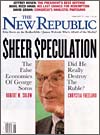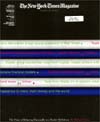
Economist, Jan. 23
(posted Saturday, Jan. 23)
The cover editorial chastises Americans for remaining loyal to President Clinton, calling their fidelity "a mixture of opportunism and delusion." The opportunism: Democrats have stuck with Clinton because his poll numbers are high and Republicans have botched impeachment. The delusion: Americans credit the president for national prosperity he has nothing to do with. ... A story notes the decline of Europe's political right, which now runs only one country in the European Union. As in the United States, the European left has co-opted the right's policies. The emerging, alarming trend: Center-right parties are beginning to ally with neofascists such as the National Front. ... A 16 page package on the Nordic countries--it's more interesting than it sounds, OK?--concludes that they're not all alike. They are badly split over the questions of the euro and Nordic neutrality. But all still have thriving economies, lavish governments, and too-high taxes.

New Republic, Feb. 8
(posted Friday, Jan. 22, 1999)
The cover bypasses impeachment and instead goes with a George Soros mini-package. A review slams Soros' "embarrassingly banal" new book, which was "rushed into print" in order to play up Soros' views on the Asian and Russian crises. Soros' economic theories, the author (an MIT economics professor) argues, are naive, simplistic, and occasionally flat-out wrong. Another article asks: Did Soros kill the Russian ruble by predicting its death? (Answer: No.) ... On the impeachment scene, one hand-wringing article decries the triumph of partisanship over any meaningful ideological principle. Another proposes that Clinton take a constitutionally permitted "temporary leave" while the impeachment trial continues (he can come back after he wins in the Senate).

New York Times Magazine, Jan. 24
(posted Thursday, Jan. 21, 1999)
The cover story by Michael Lewis relives the enviable rise--and precipitous fall--of Long-Term Capital. Lewis, a Wall Street convert himself, interviews media hermit and Long-Term mastermind John Meriwether and his legion of smart "young professors" who gambled on market hyper-rationality to power their finance strategy (as Lewis explains, "things people did with money when they were frightened was an opportunity for more reasonable people to exploit"). What sequence of events beat 50,000-to-1 odds and crunched Long-Term? Retrospectively, says Lewis, the Aug. 17 Russian ruble debacle was but the precipitating event; an expanding web of media and finance market rumors, plus Wall Street sharks out to plunder Long-Term, ensured the firm's collapse. Now Meriwether and his multimillionaire troops are back where they started--sentenced to work for a piteous $250,000 at conventionally dreary Wall Street firms. ... An article profiles Leon Wieseltier, the crack literary editor of the New Republic. Wieseltier virtually dropped out of sight after hobnobbing with the literati elite during his mid-'80s "summit of punditry." But his new hot-selling book, Kaddish, returns him to visibility.

Time and Newsweek, Jan. 25
(posted Tuesday, Jan. 19, 1999)
Newsweek's Michael Jordan cover story focuses on off-the-court Jordan. He mostly hangs out with a group of older, Southern black men, who call him "Jumper" and "Black Cat." They reveal that he swears a lot, drives like a terror, quizzes his friends on state capitals (he was a geography major), and viciously holds a grudge. A sidebar repeats the traditional wisdom that Jordan helped advertisers become colorblind. ...Time's cover warns that kids have "Too Much Homework." The article is full of anecdotes about 11-year-olds who don't finish their schoolwork till 11 p.m. The amount of homework done by 6-year-olds to 9-year-olds has tripled since 1981. Conclusion: Homework is critical at reinforcing lessons and building discipline, but sometimes less is more.
Newsweek says that a whistle-blower could help American cities in their lawsuits against gun companies. Robert Hass, a former vice president for marketing at Smith & Wesson, has testified that his company did nothing to stop the flow of arms to criminals. The company could have monitored distribution better but didn't because it wanted to keep its hands clean, Hass has said. ...Time makes yet another contribution to what must be the most tired idea in American journalism: the story of the middle American town where they're indifferent to impeachment. Time visits Emporia, Kan. (Why do they always go to Kansas or Illinois? What's wrong with New Jersey or Oregon?), and finds that--guess what?!--Kansans care deeply about their local affairs and not at all about Washington.

U.S. News & World Report, Jan. 25
(posted Tuesday, Jan. 19, 1999)
The cover story on the Internet stock bubble states the obvious warnings: Internet stocks are wildly overvalued, and the traditional rules of investing haven't changed. But it can't quite bring itself to tell investors to sell: After all, day traders and amateur stock pickers are making a fortune on the stocks. The only Internet stock that may not be overvalued, according to U.S. News, is America Online. ... A grim article describes winter life in a northern Russian town where there is no heat in the schools, the local industry--Soviet-era gulags--has vanished, most of the able-bodied workers have moved away, and those who remain have been reduced to hunting for food. ... A piece warns people receiving monthly disability payments not to sell them. Some companies pay lump sums of cash to accident victims (and others receiving annuities) in exchange for their regular payments. This may seem attractive, but it's almost always a bad deal.

The New Yorker, Jan. 25
(posted Tuesday, Jan. 19, 1999)
A long piece chronicles the horrific civil war in the Sudan, where 2 million people have died, millions more have been displaced, and thousands have been enslaved, without any end in sight. The Muslim fundamentalist government in the north is waging a brutal campaign against Christian and animist rebels in the south. The government forces kill prisoners, bomb hospitals and churches, and enslave women. The United States and most of Africa support the rebels but don't care enough to intervene. ... An article ponders the Restoration Hardware phenomenon. The store promotes the notion that its yuppie customers are making the world better by buying handsome goods made the old-fashioned way. In fact, the customers are just shopping. (For Timothy Noah's take on the phenomenon, see "Restoration Joe's" in Slate.)